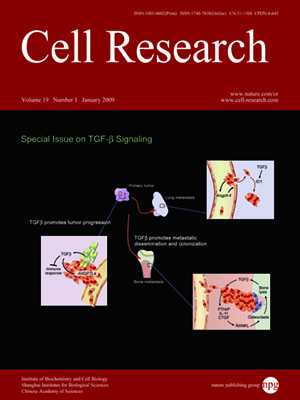
Volume 19, No 1, Jan 2009
ISSN: 1001-0602
EISSN: 1748-7838 2018
impact factor 17.848*
(Clarivate Analytics, 2019)
Volume 19 Issue 1, January 2009: 89-102
REVIEWS
Roles of TGFβ in metastasis
David Padua and Joan Massagué
Cancer Biology and Genetics Program, and Howard Hughes Medical Institute, Memorial Sloan-Kettering Cancer Center, 1275 York Avenue, Box 116, New York, NY 10065, USA
Correspondence: Joan Massagué(massaguj@mskcc.org )
The TGFβ signaling pathway is conserved from flies to humans and has been shown to regulate such diverse processes as cell proliferation, differentiation, motility, adhesion, organization, and programmed cell death. Both
in vitro and
in vivo experiments suggest that TGFβ can utilize these varied programs to promote cancer metastasis through its effects on the tumor microenvironment, enhanced invasive properties, and inhibition of immune cell function. Recent clinical evidence demonstrating a link between TGFβ signaling and cancer progression is fostering interest in this signaling pathway as a therapeutic target. Anti-TGFβ therapies are currently being developed and tested in pre-clinical studies. However, targeting TGFβ carries a substantial risk as this pathway is implicated in multiple homeostatic processes and is also known to have tumor-suppressor functions. Additionally, clinical and experimental results show that TGFβ has diverse and often conflicting roles in tumor progression even within the same tumor types. The development of TGFβ inhibitors for clinical use will require a deeper understanding of TGFβ signaling, its consequences, and the contexts in which it acts.
Cell Research (2009) 19:89-102. doi: 10.1038/cr.2008.316; published online December 2008
FULL TEXT | PDF
Browse 3591


